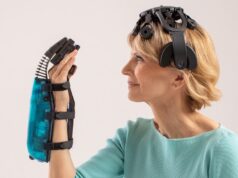 Onward Medical has announced a recent publication in Nature showing that a wireless brain-computer interface (BCI) can use patients’ thoughts to modulate ARC therapy. Researchers reported that, when paired with the company’s ARC therapy, an implanted BCI allowed an individual to gain augmented control over when and how he moved his paralysed legs.
Onward Medical has announced a recent publication in Nature showing that a wireless brain-computer interface (BCI) can use patients’ thoughts to modulate ARC therapy. Researchers reported that, when paired with the company’s ARC therapy, an implanted BCI allowed an individual to gain augmented control over when and how he moved his paralysed legs.
“The BCI establishes a continuous link between movement intentions and spinal cord stimulation [SCS], allowing for more natural restoration of mobility,” said Grégoire Courtine (École Polytechnique Fédérale de Lausanne, Lausanne, Switzerland), co-author of the Nature paper. “I look forward to working with the Onward team to advance this important new technology.”
According to an Onward press release, these published data are part of an ongoing clinical feasibility study investigating the safety and preliminary effectiveness of brain-controlled SCS after spinal-cord injury. The study findings indicate that adding a BCI to Onward ARC therapy can enable thought-controlled standing, walking and stair climbing.
The study is being coordinated by NeuroRestore co-directors Courtine and Jocelyne Bloch (Lausanne University Hospital, Lausanne, Switzerland), as well as Guillaume Charvet, head of the Medical Device Development Lab at CEA-Leti/Clinatec in Grenoble, France.
“This publication shows the remarkable potential of ARC therapy to be enhanced with the introduction of a BCI, facilitating more natural movement based on the thoughts of a person living with paralysis,” said Dave Marver, CEO of Onward. “We have positioned Onward as a leader in the BCI field with our unique understanding of SCS for people with spinal-cord injury.”
Onward’s ARC therapy can be delivered by external ARC-EX or implantable ARC-IM systems, and is designed to deliver targeted, programmed SCS. The company release notes that all Onward devices and therapies, including but not limited to ARC-IM, ARC-EX, and ARC therapy, are investigational and currently not available for commercial use.









